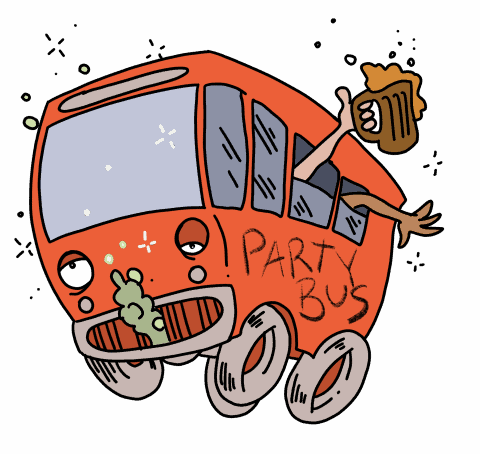
The presence of alcohol at university events can lead to safety risks for anyone involved, but student associations might be held responsible and even face punishment for hosting these types of events.
The University of Saskatchewan’s non-academic misconduct policy has a wide scope, and with the upcoming alcohol policy, associations may need to re-evaluate the typical social events and fundraising strategies they pursue in order to accommodate these regulations.
The Saskatchewan Pharmacy and Nutrition Students’ Society is currently navigating how to continue hosting social events while mitigating risks, explains Paige Wyatt, a third-year nutrition student and co-president, nutrition, of the SPNSS.
“The thing we were concerned about is that we still wanted to be able to do the events, but we just wanted to be able to do them as safely as possible,” Wyatt said. “We want to minimize the risk as much as possible, while still giving [students] the autonomy to attend the events, … have fun and make their own decisions,” Wyatt said.
It is not uncommon for associations to host social events, especially as a means to raise funds for professional-development opportunities for their members. At the Association of Constituency Presidents meeting on Oct. 18, 2017, representatives from various colleges discussed their concerns on risk management, which led the U of S Students’ Union to increase event funding this year for AOCP groups by $17,000 overall to cover additional expenses.
Deena Kapacila, vice-president operations and finance of the USSU, works with student associations to facilitate events and mitigate risks. Her biggest liability concern is pub crawls, as the students who sell tickets are liable if any incidents arise.
We are one of the only business schools across Canada that does have a university that does not have a strict policy on alcohol-related events.
— Mikaila Ortynsky, second-year human resources, Edwards School of Business
“It’s challenging when I hear of bars in the city offering students these deals. They think that they’re getting this great thing, but if something goes wrong, your life is over, essentially,” Kapacila said. “Everything you had planned out for your future gets turned on its head just from organizing a pub crawl.”
In the past, the St. Thomas More Students’ Union has hosted pub crawls, but this year, the STMSU executive has decided to move away from events that are exclusively focused on alcohol consumption, explains Jenna Casey, a fourth-year history student and the president of the STMSU.
“I don’t think that any university group … should actively promote and host pub crawls, because those are gauged towards heavy drinking — so binge drinking, which is not something we want to support, and … even the name in itself — ‘pub crawl’ — you’re there to get drunk, and that’s a liability,” Casey said.
The USSU can provide event insurance to associations for their events, which Kapacila says is a straightforward process. However, pub-crawl events and people on a pub crawl are not eligible for insurance.
“When it comes to pub crawls, … there’s no insurance. Their personal-liability insurance they get through the USSU is void. You can’t get secondary insurance for pub crawls,” Kapacila said.
Kapacila explains that if an incident occurs at any student event and a complaint is filed with the university, student organizers could be subjected to a U of S senate hearing for non-academic misconduct. She says that, often, student associations are subjected to non-academic misconduct complaints, which are pub-crawl related.
Shayan Shirazi, a second-year pharmacy student and co-president, pharmacy, of the SPNSS, also discusses that SPNSS has heavily depended on social events to fund professional-development activities for students. He notes that he is pleased to see the USSU providing extra funding for associations.
“In the next couple of months, we have things coming like mentorship night [and] many other professional-development events,” Shirazi said. “I think the university has almost recognized that. We talk to the faculty all the time — they recognize that the funds … don’t just go to other pub crawls. We use them for other learning opportunities.”

With an alcohol policy on its way, some associations may struggle to supplement their annual budget, says Mikaila Ortynsky, a second-year human resources student in the Edwards School of Business.
“We are one of the only business schools across Canada that does have a university that does not have a strict policy on alcohol-related events. I know the [Edwards Business Students’ Society] does not charge student fees, because of alcohol-related events like LB5Q, as well as specific club events like Beer Night, [which] created a revenue generator for us. Also, it enhances the student social-life experience,” Ortynsky said.
Shirazi explains that, because of the rise in expenditures as well as the drop in general attendance at these events, the SPNSS is re-evaluating their funding strategies in hopes of maintaining their professional-development events.
“It’s not like we weren’t liable for it before, so the policy makes you almost more cognizant that you are at risk and gives you an opportunity to prepare for that,” Shizari said. “Our budget is going to be restructured this year as well, … hopefully to accommodate these changes.”
However, not all students may be supportive of these changes. Ortynsky explains that any constraints on alcohol-related events would be circumvented by attendees and the act of mitigating that risk might create more stress for the organizers.
“What, are you going to limit the amount of alcohol? [Students will] go around that,” Ortynsky said. “If there was that much risk, these people wouldn’t even be holding these events.”
Wyatt also discusses that not all students have been receptive to the changes in campus culture, specifically when it comes to college traditions like the Bush Party for the College of Pharmacy and Nutrition.
“There was huge backlash against [cancelling the Bush Party], just because it had been a tradition in the college for a long time. It hadn’t always been what it had been in the last couple years. It used to be just a small event, … but it got bigger and bigger as we went on,” Wyatt said. “Lots of people still want us to have a bit of a bush party, but we know that it’s not an option for us anymore, for a variety of reasons.”
Marlize Fourie is a fourth-year physiology and pharmacology student and student co-ordinator of the student initiative What’s Your Cap? at the U of S, which advocates for alcohol moderation. She notes that students often assume their peers are consuming more alcohol than they really are, leading students to feel pressured.
“That’s also a problem in the media, where you see movies about college and it’s all about the parties. It’s not really about anything else,” Fourie said. “It’s [about] the perceived norms on campus and letting students know that isn’t actually what you have to do to have fun.”
According to a university survey from 2016 on the What’s Your Cap? website, almost 25 per cent of students self-reported that they had not consumed alcohol for a month or even 12 months. For those who reported consuming alcohol, nearly half reported that they would not consume more than five drinks at a party.
Because hosting alcohol-related events can be seen as beneficial for student associations due to the increase in attendance and in the amount of funds collected at an event, Kapacila is working to make risk management more approachable for associations. She discusses that she begins each risk-management session by talking about an innocuous subject, like potlucks, and then moves on to strategies that make social events safer for everyone.
“A lot of that has do with duty of care [and] due diligence at events — understanding that the way you plan an event can mitigate sexual assault or actually increase the likelihood of sexual assault [and] trying to get students to understand that. There’s also a lot of funny things, too — like a potluck that’s free verses a potluck that isn’t has a lot of different risks involved,” Kapacila said.
Fourie says What’s Your Cap? uses fun strategies to educate students on alcohol consumption. Their life-sized beer pong game is popular at student events, because each time someone scores, they receive beer goggles, which simulate a rise in blood-alcohol content, she says.
“We really like to do that. We really like to be invited and try [to] make it fun [to] educate students on moderate alcohol consumption. We really like to collaborate with groups, and so, we’re always willing to help students out with their events to try [to] get more people to come in without using alcohol as an advertiser or as a pull,” Fourie said.
Kapacila notes that associations can also alter their college traditions to host student events that are safer. One strategy she suggests is moving to an on-campus venue like Louis’ Pub, where the space is well lit, the bartenders are trained to recognize overconsumption and there are security personnel to monitor the crowd.
Wyatt explains that she sees a trend toward students wanting to move away from large social events where the main focus is alcohol to safer events.
“It’s really dawned on people in the past couple years that this is a rising issue in our society,” Wyatt said. “So, we have had to make some changes to accommodate that, and [we] just recognized the risk that’s involved for all our drinking events.”
—
Nykole King / News Editor
Graphics: Lesia Karalash / Graphics Editor
Leave a Reply